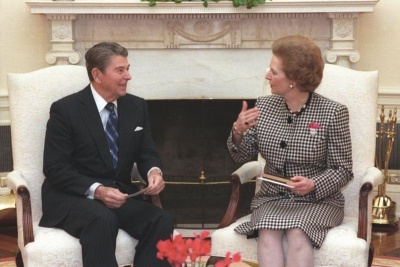Ronald Reagan/Presidency
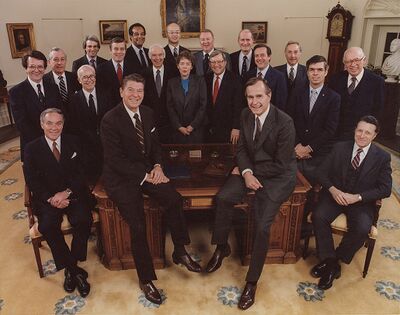 White House. U.S. Cabinet, 1981. Front row: Alexander Haig, Secretary of State; President Reagan; Vice President George HW Bush; Caspar Weinberger, Secretary of Defense Second row: Raymond J. Donovan, Secretary of Labor; Donald Regan, Secretary of Labor; Terrel Bell, Secretary of Education; David Stockman, Director, Office of Management & Budget; Andrew Lewis, Secretary of Transportation, Samuel Pierce, Secretary of Housing & Urban Development; William French Smith, Attorney General; James Watt, Secretary of the Interior; Jeane Kirkpatrick, U.S. Representative to the United Nations; Edwin Meese III, Counselor to the President; James Edwards, Secretary of Energy; Malcolm Baldrige, Secretary of Commerce; William E. Brock, United States Trade Representative; Richard Schweiker, Secretary of Health & Human Services; John Block, Secretary of Agriculture; William Casey, Director, Central Intelligence Agency | |
| Date | January 20, 1981 - January 20, 1989 |
|---|---|
| Description | The Ronald Reagan administration 1981-1989 |
For everything else regarding his life and career, including the October Surprise, see Ronald Reagan.
Ronald Reagan's tenure as the 40th president of the United States began on January 20, 1981, and ended on January 20, 1989. Reagan, a Republican from California, took office following a landslide victory over Democratic incumbent President Jimmy Carter in the 1980 presidential election. Reagan was succeeded by his vice president, George H. W. Bush.
Contents
Official narrative
For a hagiography, see pretty much any Western Commercially-controlled media outlet. The following has been compiled as an attempt to redress the balance somewhat, and put on record the things that you will either see no reference to, or which will be glossed over as minor blemishes on the record of a man who "only wanted to be liked and to do good in the world - and largely succeeded". The bulk of the article was sourced from William Blum's Anti-Empire Report.
Foreign Policy
Nicaragua
For eight long years the people of Nicaragua were under attack by Ronald Reagan's proxy army, the Contras. It was all-out war from Washington, aiming to destroy the progressive social and economic programs of the Sandinista government — burning down schools and medical clinics, mining harbors, bombing and strafing, raping and torturing. These Contras were the charming gentlemen Reagan called "freedom fighters" and the "moral equivalent of our founding fathers".
"Iran Contra"
- Full article: Iran Contra
- Full article: Iran Contra
Reagan's Vice President, George H. W. Bush, organised a large off-the-books drugs for guns deal involving cocaine importation into the USA and shipping of weapons to the "contras". Reagan's long-drawn-out statements on the subject can be summarized as follows:
- I didn't know what was happening.
- If I did know, I didn't know enough.
- If I knew enough, I didn't know it in time.
- If I knew it in time, it wasn't illegal.
- If it was illegal, the law didn't apply to me.
- If the law applied to me, I didn't know what was happening.
Libya
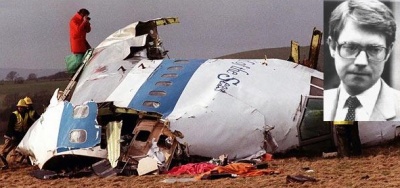
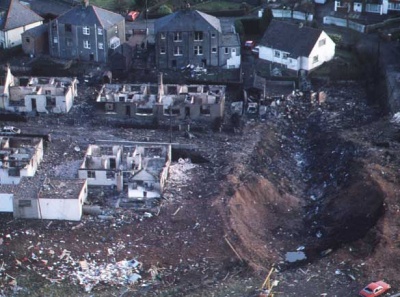
On 2 December 2010, in a video conference link to staff and students at the London School of Economics, Muammar Gaddafi alleged that the case against Abdelbaset al-Megrahi had 'been fabricated and created by' Britain's former Prime Minister Margaret Thatcher and former US President Ronald Reagan. He suggested that US CIA officials had been behind the 21 December 1988 Lockerbie bombing in which 270 people were killed.
- "These are the people who created this conspiracy" said Gaddafi, referring to the alleged role of Thatcher and Reagan in Megrahi's conviction and life sentence over the attack on Pan Am Flight 103. "The charges directed towards Libya were based on unfounded evidence in an attempt to weaken the Libyan Revolution and limit its resources and abilities".[1]
In making his allegation, Gaddafi did not include George H W Bush in this conspiracy which suggests that if Thatcher and Reagan had indeed 'fabricated and created' the Lockerbie bombing case against Libya, they would have done so in the interregnum between the 8 November 1988 US presidential election and President-elect Bush taking over from Reagan on 20 January 1989.
Gaddafi's alleged Lockerbie conspiracy could well have been hatched on 15 November 1988 when President Reagan and Prime Minister Thatcher were photographed in the White House library and would undoubtedly have discussed Iran's threat to retaliate massively for the shooting down of Iran Air Flight 655 by USS Vincennes on 3 July 1988 with the loss of 290 civilian lives. The two leaders might then have decided to open secret negotiations with Iran and seek to limit the revenge attack to just one US aircraft.[2] The US and UK would not have wanted to antagonise the Iranians further by blaming Iran for the retaliation, so would have selected 'mad dog' Gaddafi to be their whipping boy.
Western Intelligence Agencies (including the CIA, MI6 and apartheid South Africa's SSC) would have been party to such negotiations and would have had a say in selecting both the sacrificial aircraft Clipper Maid of the Seas (Pan Am Flight 103) and the target UN Assistant Secretary-General & Commissioner for Namibia (Bernt Carlsson).
Thus on 22 December 1988 (the day after the Lockerbie bombing), President Reagan phoned Downing Street:[3]
- "Margaret, I understand you have just returned from the site of the Pan Am crash. I want to thank you for your expression of sorrow on the Pan Am 103 tragedy. On behalf of the American people, I also want to thank the rescue workers who responded so quickly and courageously. Our thoughts and prayers are with the victims of this accident, both the passengers on the plane and the villagers in Scotland".
On 28 December 1988, seven days after the Lockerbie bombing, when there was as yet no evidence ostensibly pointing to Libyan culpability, Ronald Reagan in one of the last acts of his Presidency, extended sanctions against Libya and threatened renewed bombing raids.[4]
Sure enough, the joint US/UK investigation into the bombing soon found 'evidence' pointing towards Libya for the sabotage of Pan Am Flight 103. According to author and journalist, Ian Ferguson, it was a case of 'reverse engineering' whereby Libya had been fitted up for the crime and the inculpatory evidence followed (see the 2009 documentary film Lockerbie Revisited).[5]
El Salvador
El Salvador's dissidents tried to work within the system. But with US support, the government made that impossible, using repeated electoral fraud and murdering hundreds of protestors and strikers. When the dissidents took to the gun and civil war, the Carter administration and then even more so, the Reagan administration, responded with unlimited money, military aid, and training in support of the government and its death squads and torture, the latter with the help of CIA torture manuals. US military and CIA personnel played an active role on a continuous basis. The result was 75,000 civilian deaths; meaningful social change thwarted; a handful of the wealthy still owned the country; the poor remained as ever; dissidents still had to fear right-wing death squads; there was to be no profound social change in El Salvador while Ronnie sat in the White House with Nancy.
Guatemala
In 1954, a US Deep state instigated coup overthrew the democratically-elected government of Jacobo Arbenz, initiating 40 years of military-government death squads, torture, disappearances, mass executions, and unimaginable cruelty, totaling more than 200,000 victims. For eight of those years the Reagan administration played a major role.
Ronald Reagan gave dictator Efraín Ríos Montt millions of dollars of military hardware and in December 1982 went to visit him. At a press conference of the two men, Montt was asked about the Guatemalan policy of scorched earth. He replied "We do not have a policy of scorched earth. We have a policy of scorched communists." After the meeting, referring to the allegations of extensive human-rights abuses, Reagan declared that Ríos Montt was getting "a bad deal" from the media. On December 4, Reagan declared:
"President Ríos Montt is a man of great personal integrity and commitment. ... I know he wants to improve the quality of life for all Guatemalans and to promote social justice."[6][7]
The murderous nature of General Montt's regime was widely understood at the time. He was known to have remarked: "If you are with us, we’ll feed you, if not, we’ll kill you".[8]. On 10 May 2013, convicted of genocide and crimes against humanity, Ríos Montt was sentenced to 80 years imprisonment.[9]
Grenada
Reagan invaded the tiny island nation of Grenada in October 1983, an illegal and immoral war, to this day surrounded by lies (such as "endangered" American medical students). The invasion put into power individuals more in line with US foreign policy interests.
Afghanistan
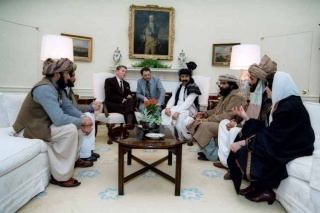
After the Carter administration provoked a Soviet invasion[How?][citation needed], Reagan came to power to support the Islamic fundamentalists in their war to eject the Soviets and the secular government, which honored women's rights. In the end, the United States and the fundamentalists "won", women's rights and the rest of Afghanistan lost. More than a million dead, three million disabled, five million refugees; in total about half the population. And many thousands of anti-American Islamic fundamentalists, trained and armed by the US, on the loose to terrorize the world, to this day.
"To watch the courageous Afghan freedom fighters battle modern arsenals with simple hand-held weapons is an inspiration to those who love freedom," declared Reagan. "Their courage teaches us a great lesson — that there are things in this world worth defending. To the Afghan people, I say on behalf of all Americans that we admire your heroism, your devotion to freedom, and your relentless struggle against your oppressors." [10]
The Cold War
As to Reagan's alleged role in ending the Cold War ... pure fiction. He prolonged it. Read the story in William Blum's Book, "Killing Hope". [11]
Other examples of the amorality of Reagan and the feel-good heartlessness of his administration
Reagan, in his famous 1964 speech, "A Time for Choosing", which lifted him to national political status:
"We were told four years ago that 17 million people went to bed hungry each night. Well, that was probably true. They were all on a diet."
Hilarious eh? and delivered with that trade-mark, disarming, self-deprecating smile of his
"Undermining health, safety and environmental regulation. Reagan decreed such rules must be subjected to regulatory impact analysis — corporate-biased cost-benefit analyses, carried out by the Office of Management and Budget. The result: countless positive regulations discarded or revised based on pseudo-scientific conclusions that the cost to corporations would be greater than the public benefit."
Kick-starting the era of structural adjustment. It was under Reagan administration influence that the International Monetary Fund and World Bank began widely imposing the policy package known as structural adjustment — featuring deregulation, privatization, emphasis on exports, cuts in social spending — that has plunged country after country in the developing world into economic destitution. The IMF chief at the time was honest about what was to come, saying in 1981 that, for low-income countries, 'adjustment is particularly costly in human terms'.
Silence on the AIDS epidemic. Reagan didn't mention AIDS publicly until 1987, by which point AIDS had killed 19,000 in the United States."
– Russell Mokhiber and Robert Weissman [12]
"Reagan's election changed the political reality. His agenda was rolling back the welfare state, and his budgets included a wide range of cuts for social programs. He was also very strategic about the process. One of his first targets was Legal Aid. This program, which provides legal services for low-income people, was staffed largely by progressive lawyers, many of whom used it as a base to win precedent-setting legal disputes against the government. Reagan drastically cut back the program's funding. He also explicitly prohibited the agency from taking on class-action suits against the government — law suits that had been used with considerable success to expand the rights of low- and moderate-income families."
The Reagan administration also made weakening the power of unions a top priority. The people he appointed to the National Labor Relations Board were qualitatively more pro-management than appointees by prior Democratic or Republican presidents. This allowed companies to ignore workers' rights with impunity. Reagan also made the firing of strikers an acceptable business practice when he fired striking air traffic controllers in 1981. Many large corporations quickly embraced the practice. ... The net effect of these policies was that union membership plummeted, going from nearly 20 percent of the private sector workforce in 1980 to just over 7 percent in 2006. "
– Dean Baker [13]
Reaganomics: a tax policy based on a notion of incentives which says that "the rich aren't working because they have too little money, while the poor aren't working because they have too much."
– John Kenneth Galbraith
"According to the nostrums of Reagan Age America, the current Chinese system — in equal measure capitalist and authoritarian — cannot actually exist. Capitalism spread democracy, we were told ad nauseam by a steady stream of conservative hacks, free-trade apologists, government officials and American companies doing business in China. Given enough Starbuckses and McDonald's, provided with sufficient consumer choice, China would surely become a democracy."
– Harold Meyerson [14]
Throughout the early and mid-1980s, the Reagan administration declared that the Russians were spraying toxic chemicals over Laos, Cambodia and Afghanistan — the so-called "yellow rain" — and had caused more than ten thousand deaths by 1982 alone, (including, in Afghanistan, 3,042 deaths attributed to 47 separate incidents between the summer of 1979 and the summer of 1981, so precise was the information). President Reagan himself denounced the Soviet Union thusly more than 15 times in documents and speeches. The "yellow rain", it turned out, was pollen-laden feces dropped by huge swarms of honeybees flying far overhead. [15]
Appointments by Ronald Reagan/Presidency
| Appointee | Job | Appointed | End |
|---|---|---|---|
| John Otho Marsh | Secretary of the Army | 30 January 1981 | 14 August 1989 |
| Michael McManus | White House/Communications Director | 15 January 1984 | 6 February 1985 |
| Faith Ryan Whittlesey | Assistant to the President for Public Liaison | 3 March 1983 | 19 March 1985 |
Related Quotation
| Page | Quote | Author | Date |
|---|---|---|---|
| Fred C. Iklé | “Approximate military parity between the superpowers enhances the importance of PSYOP and POLWAR [Political Warfare]. Major adversaries equally armed and equally capable of destroying each other must turn away from shooting wars to settle their genuine conflicts. POLWAR and PSYOP pose a lower risk of escalation. Our era has become the age of terrorism, insurgency, and limited war because each of these is an essentially political method of struggle. In this era of superpower confrontation, it is no longer facetious to set Clausewitz' dictum, "War is the continuation of politics by other means," on its head. In our modern world, international politics is the continuation of war by other means.” | Fred C. Iklé | 1986 |
Employee on Wikispooks
| Employee | Job | Appointed | End |
|---|---|---|---|
| Peggy Noonan | Speechwriter | 1984 | 1986 |
References
- ↑ "Lockerbie bomber's family preparing to sue Britain for false imprisonment"
- ↑ "A Tale of Three Atrocities"
- ↑ "Reagan phone call to Thatcher at Downing Street"
- ↑ "Exploding Lockerbie – Part 2"
- ↑ "Lockerbie conspiracy by Thatcher and Reagan"
- ↑ Schirmer, Jennifer (1998). The Guatemalan Military Project: A Violence Called Democracy. Philadelphia: University of Pennsylvania Press. p. 33.
- ↑ http://nacla.org/news/2012/3/23/central-america-between-past-and-present
- ↑ http://www.counterpunch.org/2005/09/17/rev-pat-robertson-and-gen-rios-montt/%7Cpublisher=CounterPunch
- ↑ BBC News - Guatemala's Rios Montt found guilty of genocide
- ↑ 21 March 1983, in the White House
- ↑ ISBN 1567512526 "Killing Hope: US Military and CIA Interventions Since World War II", p.17-18. Also for the five countries listed above, see the respective chapters in this book, some of which are also posted on Wikispooks
- ↑ June, 2004; Mokhiber is editor of Corporate Crime Reporter; Weissman, editor of the Multinational Monitor, both in Washington, DC
- ↑ April, 2007; Baker is Co-Director of the Center for Economic and Policy Research, Washington, DC
- ↑ Washington Post columnist, 3 June 2009
- ↑ "Killing Hope", p.349
